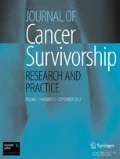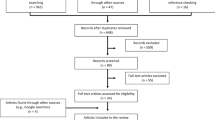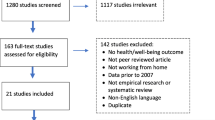Abstract
Introduction
The impact of cancer on people’s working lives is an increasingly important concern, yet, little is known regarding return to work after cancer in England. The rate of cancer patients who returned to paid employment within 18 months of diagnosis, and explored associations with demographic, clinical and work perception in one English region was investigated.
Materials and methods
A postal survey of all cancer patients registered in North West England from June 2002 through December 2002. Participants were between the ages 18–55 with a primary diagnosis of cancer, in paid employment at the time of diagnosis and being judged by their General Practitioners as suitable for return to work.
Results
Two hundrd sixty-seven eligible patients returned a completed consent form and questionnaire, a response rate of 50%. The median age was 48 years. The majority of respondents (48%) were female with breast cancer, followed by colorectal (14%), prostate (9%) and lung cancers (6%). 82% of respondents returned to work. Treatment modality (absence of surgery) and the length of sick-leave were the only significant factors related to return to work (Odds Ratio 0.28 95% CI 0.08–0.94; Odds Ratio 1.68 95% CI .1.23–2.28). The median length of sickness absence was less than 6 months, longer in the most economically deprived quintile. One fifth of those who returned to work reported deterioration in job satisfaction and career prospects.
Conclusions
While a high proportion of respondents managed to return to their place of work 20% were not able to do so. The duration of sick leave absence was associated with more difficulties in returning to work. Despite the fact that males were more likely than females to take no sick leave, they were more likely to take longer periods of absence when they did (18 months and over). In addition, the length of sick leave was greatest in the most economically deprived group, and in those survivors of cancer diagnosis and treatment who did not receive surgery.

Similar content being viewed by others
References
Office for National Statistics (2005). Cancer statistics registrations: Registrations of cancer diagnosed in 2003, England. Her Majesty’s Stationery Office: London. Accessed on 21/6/2006 from: http://www.statistics.gov.uk/downloads/theme_health/MB1_34/MB1_34.pdf.
Cancer Backup (2005). Work and cancer: How cancer affects working lives. London: Cancer Backup.
House of Commons, Committee of Public Accounts (2006). The NHS Cancer Plan: A progress report. The Stationery Office: London. Accessed on 28/6/2006 from: http://www.publications.parliament.uk/pa/cm200506/cmselect/cmpubacc/791/791.pdf.
Directory (2006). Definition of ‘disability’ under the Disability Discrimination Act. Accessed on 21/6/2006 from: http://www.direct.gov.uk/DisabledPeople/RightsAndObligations/YourRights/YourRightsArticles/fs/en?CONTENT_ID=4001069&chk=Bjab3%2B.
DWP (2006). Security in retirement: Towards a new pension system. Cm 6841. The Stationery Office: London accessed on 21/6/2006 from: http://www.dwp.gov.uk/pensionsreform/pdfs/white_paper_complete.pdf.
Farley Short, P., Vasey, J., & Tunceli, K. (2005). Employment pathways in a large cohort of adult cancer survivors. Cancer, 103, 1292–1301.
Bradley, C., Oberst, K., & Schenk, M. (2006). Absenteeism from work: The experience of employed breast and prostate cancer patients in the months following diagnosis. Psycho-Oncology, 15, 739–747.
Bradley, C. J., & Bednarek, H. L. (2002). Employment patterns of long-term cancer survivors. Psycho-Oncology, 11, 188–198.
Spelten, E., Sprangers, M., & Verbeek, J. (2002). Factors reported to influence the return to work of cancer survivors: A literature review. Psycho-Oncology, 11, 124–131.
Maunsell, E., Brisson, C., Dubois, L., Lauzier, S., & Fraser, A. (1999). Work problems after breast cancer: An exploratory qualitative study. Psycho-Oncology, 8, 467–473.
Main, D. S., Nowels, C. T., Cavender, T. A., Etschmaier, M., & Steiner, J. F. (2005). A qualitative study of work and work return in cancer survivors. Psycho-Oncology, 14, 992–1004.
McDonald, R. (2006). Creating a patient-led NHS: Empowering ‘consumers’ or shrinking the state? In L. Bauld, K. Clarke, & T. Maltby (Eds.), Social Policy Review 18: Analysis and debate in social policy (33–49). Bristol: Policy.
Alcock, P. (1999). Development of social security. In Introduction to social security: Policies, benefits and poverty (48–78). London: Routledge.
Directgov (2005). Benefits and financial support. Accessed on 14.3.2007 from: http://www.direct.gov.uk/en/Bfsl1/BenefitsAndFinancialSupport/DG_10018913.
Bouknight, R., Bradley, C., & Luo, Z. (2006). Correlates of return to work for breast cancer survivors. Journal of Clinical Oncology, 24(3), 345–352.
OPDM (2004). The English Indices of Deprivation. London: Office of the Deputy Prime Minister (OPDM).
Feuerstein, M. (2005). Cancer survivorship and work. Journal of Occupational Rehabilitation, 15(1), 1–2.
CRUK (2003). Numbers of new cases and age specific incidence rates by sex, breast cancer, UK. Accessed on 6.2.2007 from: http://info.cancerresearchuk.org/cancerstats/types/breast/incidence/.
Sanchez, K. M., Richardson, J. L., & Mason, H. R. (2004). The return to work experiences of colorectal cancer survivors. AAOHN Journal, 52(12), 500–510.
Acknowledgements
We are grateful to all participants who took part in this survey; Macmillan Cancer Support who funded the study; The North Western Cancer Intelligence Service; Janine Arnold for her support with the analysis and Sue Tizini for providing administrative support.
Author information
Authors and Affiliations
Corresponding author
Rights and permissions
About this article
Cite this article
Amir, Z., Moran, T., Walsh, L. et al. Return to paid work after cancer: A British experience. J Cancer Surviv 1, 129–136 (2007). https://doi.org/10.1007/s11764-007-0021-2
Published:
Issue Date:
DOI: https://doi.org/10.1007/s11764-007-0021-2




